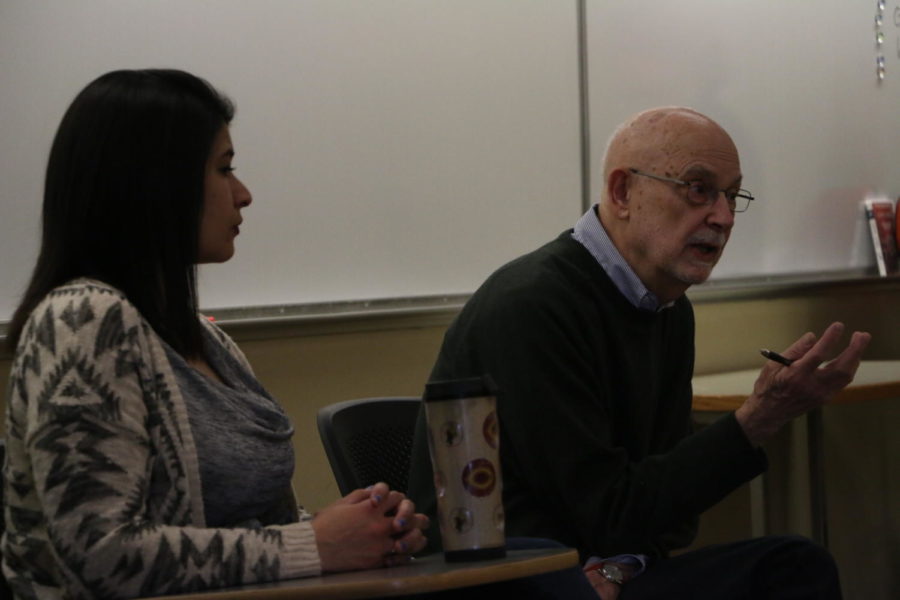Panel discusses the role of respect in the First Amendment
April 11, 2018
The topic of free speech is one that has created a lot of debate lately, especially in regards to its role on college campuses and the line, if there is one, of hate speech.
Wednesday a panel of Iowa State campus leaders held a discussion on the what role respect for others’ might play in protecting free speech. The discussion was the first of a series on conversations happening called “Depth & Dialogue” as a part of the First Amendment Day events happening on campus over the next few days.
The panel was comprised of three Iowa State community members and a moderator. The panel members were Jonathon Sturm, professor and president-elect of Faculty Senate, Michael Norton, university counsel, and Daniela Flores, graduate student in ecology, evolution and organismal biology.
John Whyte, a Canadian constitutional advisor and law expert was the moderator for the event. Whyte will also be presenting the first of two keynote addresses for First Amendment Day Wednesday at 7 p.m. in Howe Hall.
The panel’s discussion centered around what the arguments for and against protecting others from experiencing painful and personally attacking speech might be, in the larger conversation about protecting free speech as a whole.
Norton, who operates as a lawyer for the university, said that even if there are compelling reasons that one might feel they shouldn’t endure hateful speech, the university has to follow the letter of the law.
“From a university prospective, we don’t have the luxury of saying this is where I’d like the law to be,” Norton said. “From the chair of general counsel, I have to say what the law is.”
On Iowa State’s campus, the university has the power to govern. Norton said that it is the job of the university to follow the law in determining what is protected speech and what is not, no matter if there might be questions as to if that speech should have been said.
Sturm elaborated on his feelings about the role of hateful speech within the First Amendment.
“It’s not always that we can’t say that, it’s that we shouldn’t,” Sturm said.
Sturm also mentioned that he thinks the way to “negotiate” that area is by asking questions to people that have drastically different opinions, instead of getting personal and being hateful with speech.
Whyte guided the discussion to focus on what, if any, benefits suppressing hate speech might have.
“The fundamental principle of the First Amendment is based on the fact that in the long run, truth will prevail over error if it’s exposed to light,” Norton said. “The suppression of speech, even bad speech, destabilizes democracy. You don’t change someone’s mind by telling them they can’t speak their mind.”
The role of the university in the issue was also a central topic in the discussion. Flores, who does and has done a lot of teaching herself as a graduate student, touched on educators role.
“Part of our job as educators is to teach students to think critically about their opinions and the opinions of others and part of doing that is being able to hear all of the different viewpoints,” Flores said.
Listening to the viewpoints of others helps to create an inclusive environment where everyone feels heard, Flores said.
Norton said that while the university has an obligation to follow the law and allow protected speech to occur, even if it might be hurtful to some, he sees the university also helping those who might be affected.
“As a university what we try to do is instead of focusing on the speaker and restricting that speakers speech, we want to focus on the hearer,” Norton said. “What can we do to support someone who’s been impacted negatively, by someone else’s thought or speech, and how we can help them be successful even when they are surrounded by uncomfortable or hateful thoughts.”
“If we focus too much of the speaker there’s not a whole lot that we can do, but that doesn’t mean that there’s nothing that we can do. We can support the hearer.”
The panel gravitated toward the idea that restricting speech with a heavier hand hurts democracy, but there still must be some line about what speech is necessary and what speech is just purely hurtful and doesn’t help society.
Norton said that when the university is protecting speech, they aren’t looking for a space of total agreement. The goal is to have a campus that fosters a multitude of ideas that can conflict with each other and create even better ideas through discussion.
“We are blessed by the diversity of views and we need to figure out a way of recognizing that there are different cultural values of being at university and cultural values of relating to each other and that they’re not easy to adjust to,” Whyte said. “But it doesn’t mean that the different values don’t have to be recognized.”







